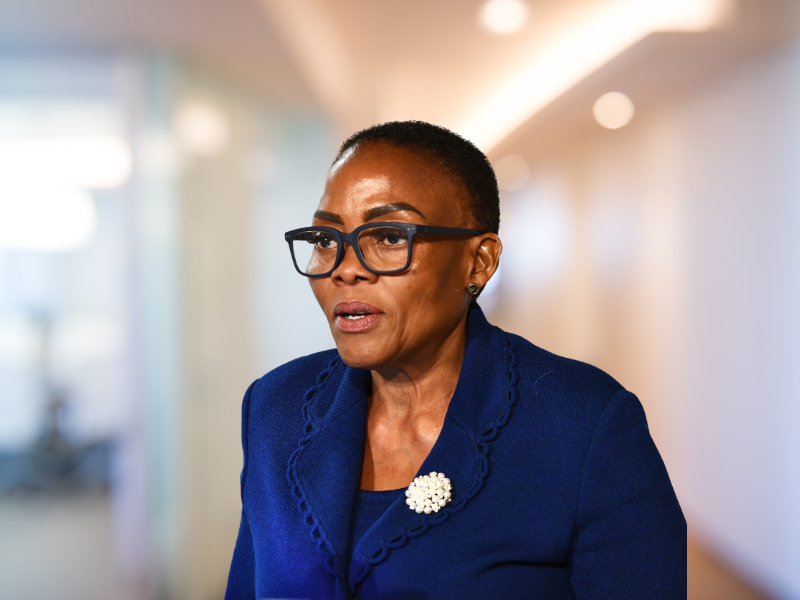
4 minute read
Hon. Pinky Kekana | Women In Leadership
Driving Transformation In South Africa's Public Service
By Jessie Taylor
South Africa’s public service plays a critical role in ensuring that the government delivers on its mandate to citizens. At the heart of this effort is the Department of Public Service and Administration (DPSA), tasked with building a professional, ethical and accountable public sector that drives inclusive growth and development.
Among the leaders driving this mission is Deputy Minister Pinky Sharon Kekana, a dynamic woman whose career reflects resilience, leadership, and an unwavering commitment to professionalising the public service.
An Advocate For Transformation
Born in Limpopo in 1966, Ms Kekana has built an impressive career spanning education, politics and administration. She began her professional life as a teacher before stepping into public service, where she quickly established herself as a leader dedicated to transformation and empowerment.
Her political career took shape within the African National Congress (ANC), where she served in key leadership roles, including as a Member of Parliament and later as the Deputy Minister of Communications. During her tenure in the communications portfolio, Ms Kekana was instrumental in advocating for digital transformation, data affordability, and the bridging of the digital divide, particularly for women and rural communities. These values continue to shape her work in the DPSA, where professionalisation and inclusivity are core priorities.
The DPSA is at the forefront of modernising South Africa’s public service. It provides leadership in human resource management, ethics, conditions of service, and capacity development across the public sector. The department also spearheads programmes to strengthen accountability and efficiency, ensuring that public service workers are equipped to deliver quality services that meet the needs of all citizens.
For Ms Kekana, professionalising the public service means more than efficiency - it is about instilling integrity, fairness and a citizen first ethos. The National Framework Towards the Professionalisation of the Public Service, which the DPSA leads, sets out to attract skilled professionals, ensure merit-based appointments, and build a capable, ethical workforce.
Ms Kekana has been an outspoken advocate for ensuring that recruitment and promotion in the public sector are based on merit and competency rather than patronage. She has emphasised that the future of the South African state depends on a cadre of public servants who are not only technically skilled but also committed to ethical conduct.
Championing Professionalisation
Ms Kekana has stressed the importance of aligning public service with the National Development Plan (NDP) and the ethos of Batho Pele, which is putting people first. She has consistently highlighted how corruption and inefficiency undermine trust and why professionalisation is central to rebuilding confidence in government institutions. As one of South Africa’s leading women in government, Ms Kekana has been an advocate for gender equality in leadership and public service. She has mentored women and encouraged young professionals to see the public sector as a viable and fulfilling career path.
Her leadership style reflects a balance of empathy and firmness, and she has often spoken about the importance of breaking barriers for women in governance. This aligns with South Africa’s broader goals of ensuring gender representation and equity in senior roles across both the public and private sectors.
Central to Ms Kekana’s work is ensuring that the DPSA drives ethical reforms. Through initiatives aimed at curbing corruption and promoting transparency, she has supported frameworks that demand accountability from public officials. These efforts include better systems for monitoring performance, enhancing compliance with public finance regulations, and ensuring consequences for unethical behaviour. Kekana’s approach underlines that ethical leadership is not only about rooting out wrongdoing but also about building cultures of trust and responsibility. This is particularly important in a country where service delivery failures can deeply affect communities.
In addition to professionalisation, Ms Kekana has continued to champion digital innovation within the public service. She has argued that technology must be leveraged to modernise systems, reduce inefficiencies, and make services more accessible. Digitalisation of government services – such as e-governance platforms and electronic records management –are central to the DPSA’s agenda. For Kekana, ensuring that these tools are inclusive and accessible across urban and rural areas is a priority. In this sense, her work bridges her earlier communications portfolio with her current role, ensuring continuity in advancing South Africa’s digital readiness.
Ms Kekana has positioned herself as a champion of youth empowerment in the public service. She has emphasised the importance of internships, training and graduate placement programmes to bring fresh talent into the sector. Her vision is to create a generational shift in which young professionals see public service as a noble career, built on merit, skill and passion for change.
Sources: Citizen | Government Communication and Information System | DPSA | SchoemanLaw Inc

